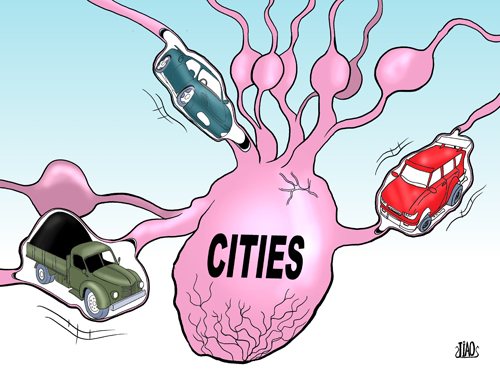Time to stop 'big meeting' traffic controls

There's an ironic joke here in China that you're safer in war zones like Baghdad than Beijing because in Iraq at least an ambulance can reach you, while in Beijing calling ambulance during rush hour is like playing Russian roulette. The game can easily turn nasty if the weather is bad, there is a car accident, or if there is a big government meeting going on.
Before the annual meetings of the National People's Congress (NPC) and the Chinese People's Political Consultative Conference (CPPCC) bring any new policies into effect, one clear impact is notorious traffic jams in Beijing. Taxi drivers say the traffic is so bad that there is almost no difference between rush hours and regular hours. Bloggers post messages on Twitter-like mini blogs such as Weibo, to share the latest information about traffic jams. Although gridlock has become commonplace in China's big cities, the scene on Beijing's streets these days is something else again.
The major reason is the traffic controls imposed during the meeting season. The Beijing police stop all the vehicles on the road to clear the streets for those attending the parliamentary sessions pass through. The main road affected is Chang'an Street – the major thoroughfare connecting the east and west of the city. And since the meetings normally start at 9:30 in the morning and finish at 5 o'clock at night, the traffic controls coincide with rush hour. Although the traffic authorities said that the two sessions will cause less disruption this year than last, in practice the recurrent traffic controls at inappropriate times and locations have turned the Beijing traffic in to a huge mess inconveniencing not only locals, but people and businesses nationwide.
Days before the two meetings actually start, the traffic authorities begin to take action. This year, the Beijing Traffic Management Bureau announced temporary restrictions on vehicles with out-of-town licenses, meaning that non-Beijing registered cars have to stay outside the five ring roads for the entire period of the annual sessions, from February 28 to March 15. So, with some exceptions such as ambulances, if non-Beijingers want to drive to the capital during this period, they must apply for a special license – a process that can take days.
 0
0 







Go to Forum >>0 Comments